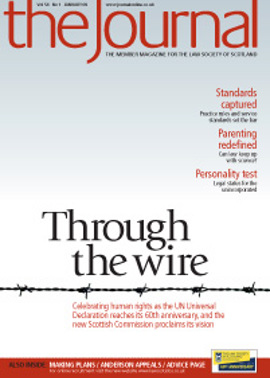Collaboration: a new dimension

2009 marks the 20th anniversary of the Family Law Association, and of collaborative practice in the USA. FLA will need no explanation, but collaborative practice may still not be so familiar. To encourage interest, here is a quote from Mr Justice Coleridge, speaking at another anniversary celebration, the fifth of collaborative practice in the UK: “I wish you had issued shares in Collaborative Law Ltd and I had bought some. The speed and scale of its success as a movement would have brought some much needed relief from the relentless gloom emanating from the City. It would now be time to consider a flotation!”
So what is collaborative practice, why did it develop and how might it affect you? The starting point is in family law, although it is developing beyond that field. The fact that FLA and collaborative practice started 20 years ago is no coincidence. By then, divorce had become a social reality rather than an unusual event. The potential damage to children whose parents were separating amid a great deal of hostility was becoming clear.
Obstacles to agreement
The 1985 Family Law (Scotland) Act introduced a far sighted framework for financial provision on divorce which has the concept of fair sharing at its core, irrespective (save for the most unusual circumstances) of why a marriage broke down. In other words, everything was in place to encourage separation to be dealt with in as civilized a manner as possible. Two obstacles emerged: the emotional impact of a separation; and the adversarial nature of the court system.
It is unusual for both parties in a separation to be at the same stage
of adjustment. For both there will be very real anxieties about the future. For the one who is further back, the landscape is likely to look particularly hostile, with the tendency to see the estranged partner as the enemy. Mediation can be a valuable option, but the takeup is not high.
At best, family lawyers act as a buffer sufficiently well to allow plans to be made by negotiation, with parents reaching some sort of accommodation. At worst, the adversarial nature of the process, especially if court proceedings are needed, can cause lasting damage to the ecology of the family.
A family lawyer in Minnesota, Stu Webb, decided he would not be party to that process any more and said that he would only take instructions if there was a commitment from parties and agents to a problem-solving approach. That was the birth of collaborative practice. If matters are not resolved in the collaborative process the collaborative lawyers will not represent the clients in court. The process involves a series of meetings; at its heart are four-way meetings with all parties present. All negotiation is done at those four-way meetings. Communication between lawyers otherwise is restricted to exchanges of agreed information. There are now lawyers qualified in collaborative practice throughout Scotland, part of a movement which is growing internationally.
Combining disciplines
Counsellors and financial experts who were working with separated couples also saw the advantages of this approach. This sparked the development of collaborative practice into an interdisciplinary way of working which can deal creatively and effectively with all three strands of a separation – legal, emotional and financial. In October 2008, practitioners from Vancouver came to provide training in interdisciplinary practice to a group of lawyers and those from counselling and financial backgrounds, allowing this approach to be available in Scotland. The training generated great enthusiasm.
Interdisciplinary collaborative practice allows a couple to receive emotional support, legal guidance and financial advice in a joined-up way. The collaborative practitioners have trained together and have an understanding of one another’s disciplines and objectives. The counsellors act as coaches to enable any gap in adjustment to be bridged, to enable the couple to communicate to one another effectively and to deal with the detailed childcare arrangements, going through the same process (including four-way meetings) as the lawyers. The lawyers provide information and advice about the legal framework, identify what information is needed to be able to plan, and then help a couple identify and assess options for settlement. In this they are assisted by financial neutrals who will outline the range of financial possibilities.
In a debate in the Scottish Parliament on 11 September 2008, Nigel Don MSP commended solicitors in Scotland who are developing the concept of collaborative law, and Justice Minister Kenny MacAskill pledged to assist the collaborative law approach.
Interested? There will be further basic training in collaborative family law on 25 and 26 March and 22 April 2009 in Perth. The Vancouver trio will be returning to provide more training in interdisciplinary practice soon after, probably in May in Edinburgh.
In this issue
- Public law in Scotland
- Harmony in conflict management
- Tapping Reeve and his legacy
- Busy times at 60
- Living wills - why?
- Forward by the rights
- A cornerstone of rights
- Welcome for rejections takeup
- Sins of omission
- A time to buy?
- Parenthood reborn
- Persons unknown
- Front of the class
- Setting the standards
- Client service: the standards
- Judicial appointments: how you can take part
- ABS - the next phase
- Third parties and premature complaints
- Planning to perform
- Manual for the mind
- Computing on tap - or money down the drain?
- When resolution is not enough
- Ask Ash
- Making up lost time?
- Don't get caught short by transfer traps
- Collaboration: a new dimension
- Packed and ready
- Regulator on a roll
- Scottish Solicitors' Discipline Tribunal
- Website review
- Book reviews
- Medicines: the wrong cure
- Fraud alert! (and a cautionary tale)






